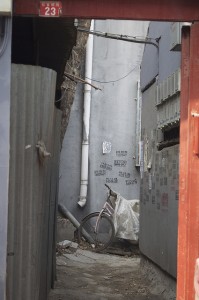 She moved from the chair to the window (thinking about explaining something, but not sure what it should be. There were bottomless things to explain, like why she thought of herself as one thing, yet acted opposite; yearned for the chair yet moved to the window, felt like a giant cockroach head, resulting in being able to make it no further than the window wall. Leaning on the wall, she held her shoulders pulled into her chest like a woman of whom so little is expected that nothing at all is performed. She wanted to say a few things at once. Maybe if she flung her eyes to the right and her mouth to the left she might be able to say it all.)
She moved from the chair to the window (thinking about explaining something, but not sure what it should be. There were bottomless things to explain, like why she thought of herself as one thing, yet acted opposite; yearned for the chair yet moved to the window, felt like a giant cockroach head, resulting in being able to make it no further than the window wall. Leaning on the wall, she held her shoulders pulled into her chest like a woman of whom so little is expected that nothing at all is performed. She wanted to say a few things at once. Maybe if she flung her eyes to the right and her mouth to the left she might be able to say it all.)
––
Josey Foo works in mixed forms and is the author of 3 books. The latest, A Lily Lilies, co-written with the dancer/choreographer Leah Stein, contains photographs, poetry and notes on dance and focuses on the impulse to move. A 2001 recipient of a National Endowment Literature Fellowship for poetry and Mid-Atlantic Arts Foundation Fellowship for fiction, she lives in the high desert of the Four Corners. She is found online at joseyfoo.com

5 comments
Jeff Brown says:
May 15, 2014
Josey,
Again your story is like a dream to me. The way it moves between opposites, without rationality really, it’s more like a feeling. Like the feeling of not quite being where you are supposed to be, but unable to move. I really appreciated it.
Movement and the Essay: Josey Foo | BREVITY's Nonfiction Blog says:
May 28, 2014
[…] Foo discusses how she came to write her exquisitely minute essay “So Little” in the new issue […]
Olivia says:
Jun 17, 2014
There’s something about this piece. I was trying to put how I feel about it into words, but it seems Jeff Brown has done that for me. Keep on, keepin’ on.
“So Little” by Josey Foo | says:
Jun 21, 2014
[…] from Brevity Issue 46: May 2014 […]
Flash Special – Creative Nonfiction (June 2015 / 15.12) | Blue Fifth Review: Blue Five Notebook Series says:
Jun 30, 2015
[…] Simple enough? But even with this key constraint – tell the truth, dammit! – the possibilities are seemingly infinite, from a straight-forward chronological memoir such as Frank McCourt’s Angela’s Ashes to the experimental works of Ander Monson or Maggie Nelson. Some stories are told in the simplest of language, and some are filled with lyrical riffs (Lia Purpura, Eula Biss). Some are quite lengthy (Proust) and some remarkably brief (Josey Foo). […]